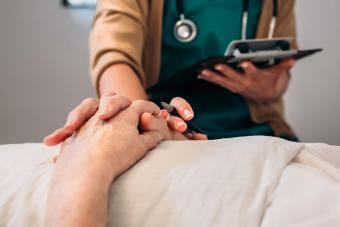
In this Grief Recovery Institute interview, Executive Director Russell Friedman discusses how his program can help people in grief recovery or individuals who want to help others mourn the loss of a loved one through a four-day Grief Recovery Certification Training program. He is also the co-author of The Grief Recovery Handbook, When Children Grieve, and Moving On.
The Grief Recovery Institute Interview with Russell Friedman
LTK: What is the mission of The Grief Recovery Institute?
Russell Friedman (RF): To help the largest number of grieving people in the shortest time possible.
LTK: What is your approach in helping someone through the grieving process?
RF: It might surprise people to learn that grief is not a process; and it might surprise even more to hear that no one needs help grieving. I recently wrote an article called, Everyone Grieves In Their Own Way And Pace. The bottom line is that people need help with recovery not with grief.
There is no simple, bullet point answer to the question about our approach to helping grieving people. First and foremost is that we do not believe in intervention when it comes to grief. So there must be a willing participant.
Second is to say "Recovery or completion from grief or loss is achieved by a series of small and correct choices made by the griever." At the Grief Recovery Institute, our job is to educate people to those choices and guide them in taking the actions outlined in our books and trainings.
Third would be to say that while "grief is the normal and natural reaction to loss of any kind," most of what we learned about dealing with loss is not normal, unnatural, and definitely unhelpful. So grieving people are trapped with the feelings of loss but without effective ideas or actions to deal with them. Again, our job is to help them understand what the action choices are and create a safe environment in which they can take them.
LTK: When is it a good time for someone to seek guidance from Grief Recovery?
RF: On pages 16 and 17 of The Grief Recovery Handbook there's a section that asks, "When is it time to begin to recover?" The answer to that question is framed in two other questions:
- If you fell down and gashed your leg and blood was pouring out, would you immediately seek medical attention? The obvious answer is yes.
- If circumstances and events conspired to break your heart, would you seek attention immediately, or would you allow yourself to bleed to death emotionally? Pick one!
In fact, the closer you are in time to the loss event, the more accurate your memories are of the relationship with the person who died, or from whom you are just divorced or estranged. And because over time, grieving people tend to create larger than life memory pictures, in which they either enshrine or bedevil the people in their lives, it is most helpful to take Grief Recovery actions sooner rather than later.
LTK: If someone has been mourning for years, is it too late to get help now?
RF: No, it is never to late to get help. Amazingly enough, the principles and actions of Grief Recovery work - even when it has been 20, 30, 40 or more years since the loss event occurred. The biggest problem for people who have been carrying their grief around for a long time is that they develop a "relationship to their pain," and they often cling to it even though it is destroying them.
Unresolved grief is cumulative and cumulatively negative, and because time can't heal an emotional wound - only actions can - it is essential to get to work on what is left unfinished between the griever and someone who has died or from whom they are divorced or estranged.
LTK: Is all grief the same?
RF: Every relationship that has ever existed between people is unique-there are no exceptions. Therefore all grief is unique-no exceptions. With that in mind, we never compare grief. We don't compare death to divorce but we also don't compare death to death. Example: If you have two widows, and one of them had a wonderful loving sweet relationship with her spouse who died; and the other widow had a stormy, tempestuous, alcoholic relationship with her spouse who died, what do they have in common? Nothing-other than the intellectual fact that they each had a spouse die. The key to grief and to recovery is the unique relationship that has been ended or changed due to death, divorce or other circumstances.
LTK: Are your teachings and guidance universal in that it helps people through the loss of a child, a spouse or a close friend?
RF: The principles and actions of Grief Recovery apply to all losses, and not just death or divorce. The key is not the "death of a child" or the "death of a spouse," it is what is left emotionally unfinished in my unique relationship with my child who died, or my spouse who died.
The principles and actions of Grief Recovery also apply to and can be used to help people deal with losses related to career, health, loss of faith and many other tangible and intangible losses - such as loss of trust, etc.
LTK: How is Grief Recovery different for an adult versus a child?
[[Image:When Children Grieve.jpg|right|90px|[When Children Grieve book]|When Children Grieve]]
RG: This is a tricky question because comprehension of death and other losses is different for children depending on their ages. A very young child does not understand the permanence of death, thus will usually not demonstrate feelings of loss when grandma dies. But once a child understands loss and can communicate sadness and other feelings related to loss events that happen, the essential actions of Grief Recovery do not change. Our second book, When Children Grieve, carries the subtitle For Adults to Help Children Deal with Death, Divorce, Pet Loss, Moving and Other Losses. In it we outline the actions for parents and other adult guardians to use to help children deal with all losses. Essentially the actions are the same as grieving people use in The Grief Recovery Handbook.
Educating Grief Helpers
LTK: How does the institute help people who are interested in helping individuals through grief?
RF: The Grief Recovery Institute provides the most comprehensive training available anywhere for teaching people how to help grievers. The Grief Recovery Certification Training program is an intensive four-day training. It is both experiential and didactic and insists that in order to teach Grief Recovery, each participant must demonstrate to us that they will take the actions of Grief Recovery that they will then use to guide others. If the helper is not complete with his or her own losses, they will not be able to effectively hear and guide the people who come to them for help.
In addition to the actual training, the institute provides ongoing support for those we train and certify so that at all times the grievers they are helping get the full benefit of our cumulative 50 years of experience.
LTK: Does a person need any specific educational background or prior experience in grief recovery?
RF: No. All that is required is a genuine desire to help grieving people. Mainly, we train therapists, social workers, funeral directors, and clergy. But a significant percentage of people who attend the trainings are non-professionals whose lives were massively affected by loss. They not only have a desire to help others, but often to make sure that others don't have to wait as long as they did to find out that recovery is even possible. Interestingly enough, it is typically easier to train those who don't have formal degrees in mental health professions since we don't have to "unteach" them things they've learned that are not really helpful for grievers.
LTK: What is The Grief Recovery Handbook and how can people use it?
[[Image:Grief Recovery Handbook.jpg|left|90px|[Grief Recovery Handbook book]|Grief Recovery Handbook]]
RF: The Grief Recovery Handbook - 20th Anniversary Expanded Edition [HarperCollins, 2009] - with the subtitle, The Action Program for Moving Beyond Death, Divorce, and Other Losses including Health, Career, and Faith, written by John W. James and Russell Friedman, is a full length book with more than 500,000 copies in print, starting with the self-published version written by institute founder John W. James in 1987. It contains all the principles and actions of Grief Recovery, in detail, with specific guidelines to help people working in partnerships of two or individually. Each person works on his or her own loss and provides a listening ear and heart for his/her partner. One partner might work on his/her relationship to someone who died, while the other might work on a divorce. The losses don't need to match - in fact, it's better if they do not.
Additional Resources from The Recovery Institute
We have written scores of helpful articles that are posted on our website. The articles can be downloaded and printed for no fee. If this interview whetted the readers' appetite for more information about dealing with grief, then we recommend they spend time reading those articles.
LoveToKnow Death and Dying would like to sincerely thank Russell Friedman for sharing his knowledge and time for The Grief Recovery Institute interview.







